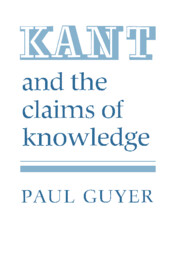Book contents
- Frontmatter
- Contents
- Acknowledgments
- Note on sources
- Introduction
- Part I Kant's early view
- Part II The transcendental deduction from 1781 to 1787
- Part III The principles of empirical knowledge
- Part IV The refutation of idealism
- Part V Transcendental idealism
- 15 Appearances and things in themselves
- 16 Transcendental idealism and the forms of intuition
- 17 Transcendental idealism and the theory of judgment
- 18 Transcendental idealism and the “Antinomy of Pure Reason”
- Afterword
- Notes
- Index of passages cited
- General index
17 - Transcendental idealism and the theory of judgment
Published online by Cambridge University Press: 09 March 2010
- Frontmatter
- Contents
- Acknowledgments
- Note on sources
- Introduction
- Part I Kant's early view
- Part II The transcendental deduction from 1781 to 1787
- Part III The principles of empirical knowledge
- Part IV The refutation of idealism
- Part V Transcendental idealism
- 15 Appearances and things in themselves
- 16 Transcendental idealism and the forms of intuition
- 17 Transcendental idealism and the theory of judgment
- 18 Transcendental idealism and the “Antinomy of Pure Reason”
- Afterword
- Notes
- Index of passages cited
- General index
Summary
My claim that the transcendental theory of experience does not itself imply transcendental idealism would be undercut if Kant could successfully argue from his theory of empirical judgment itself- that is to say, from his theory of subjective and objective time-determination – to the conclusion that things as they are in themselves are not really spatiotemporal. There are several places in which Kant tries to argue for the general thesis that the activity of the understanding can be understood only as the imposition of rule-governedness on objects which cannot be subject to the rules they appear to satisfy independently of our judgment of them, as well as for the particular thesis that special features of the intellectual activity of time-determination require the nontemporality of the real self and, apparently, of the objects which the self represents through the medium of its only apparently temporally successive representations. This chapter will show that these arguments fail.
As we have seen, Kant's transcendental theory of experience ultimately turns on the argument that judgments about the temporal relations of even inner states depend on their correlation with the rule-governed states of objects independent of the self, which are represented as independent of our representations of them precisely by being represented as in space. Sometimes Kant simply infers that because the spatiality of the objects which serve as evidence for judgments of time-determination does not represent a feature of those independent objects as they are in themselves, neither can the temporality of the self be a real feature of the self.
- Type
- Chapter
- Information
- Kant and the Claims of Knowledge , pp. 371 - 384Publisher: Cambridge University PressPrint publication year: 1987



